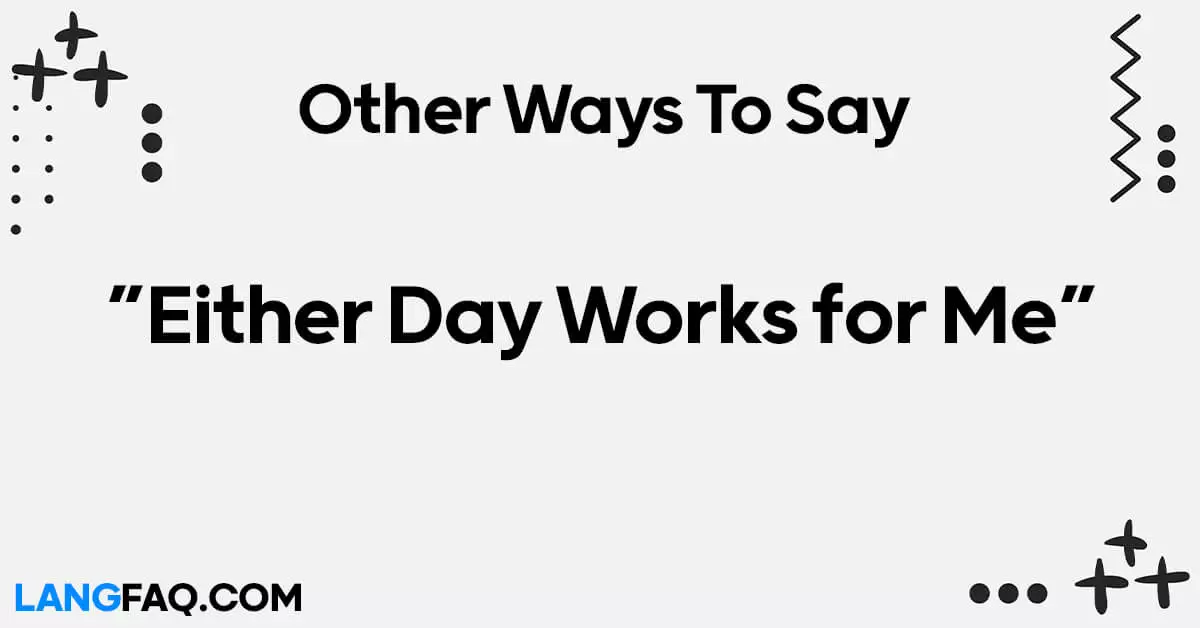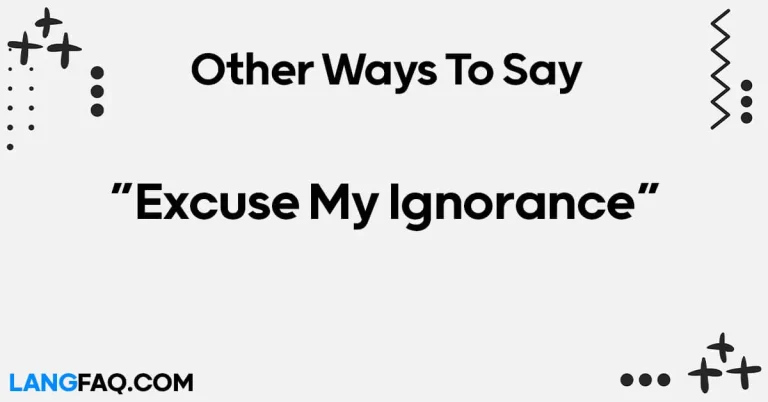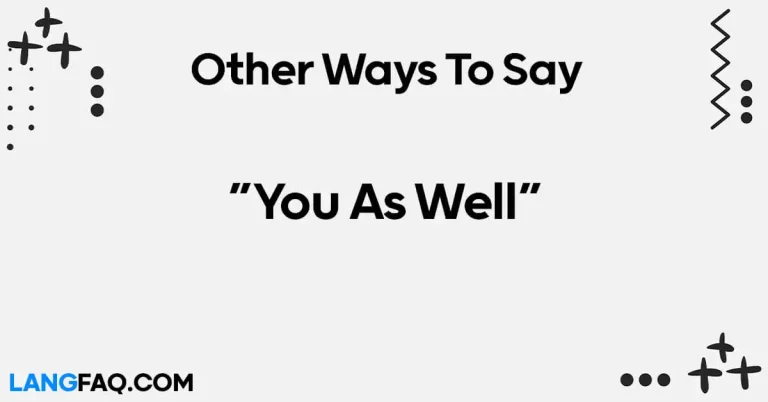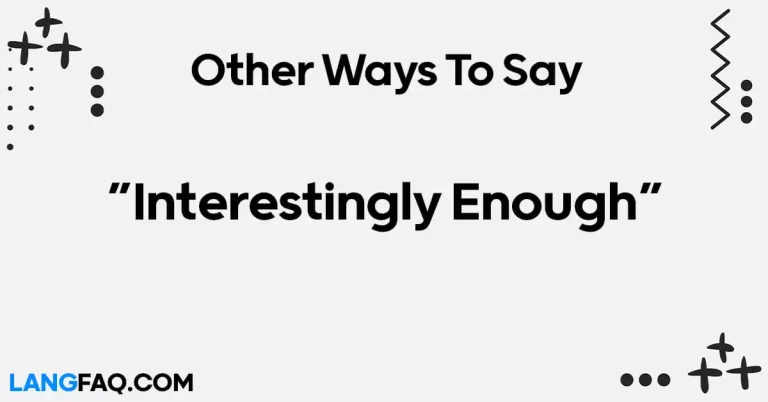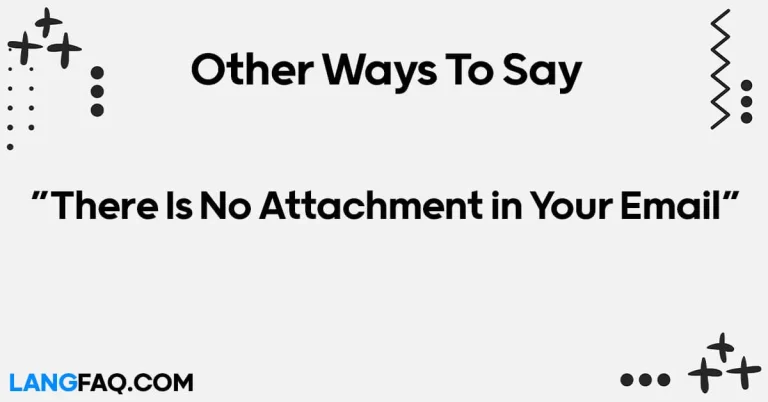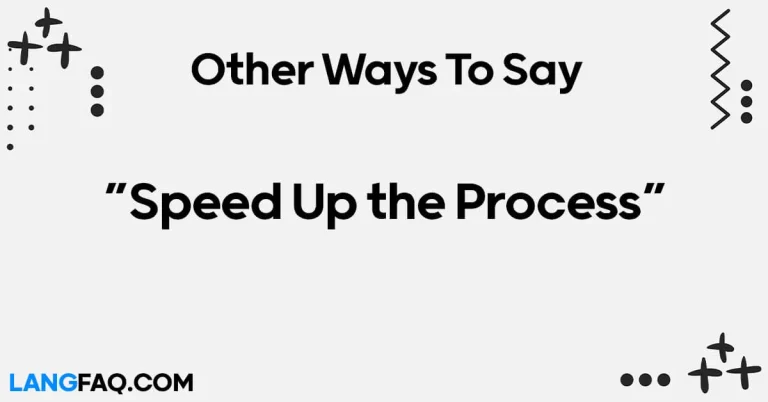In today’s fast-paced world, effective communication is essential. When someone suggests a meeting or an appointment, it’s crucial to respond promptly and courteously.
One common response is “Either day works for me,” but using this phrase repeatedly can become monotonous.
To enhance your communication skills, we’ve compiled a list of 12 alternative phrases you can use to convey the same message with a touch of variety and politeness.
12 Other Ways to Say “Either Day Works for Me”
Here are 12 alternative ways to say “Either day works for me”:
- “I’m available on any day you prefer.”
- “You can pick the day that suits you best.”
- “Feel free to select a convenient date.”
- “Let me know your preferred day, and I’ll adjust.”
- “I’m flexible with my schedule, so you choose.”
- “Any day that works for you is fine with me.”
- “Name a date, and I’ll make it work.”
- “I’ll accommodate your schedule, just tell me when.”
- “Your schedule takes priority; I’ll fit in.”
- “Whenever you’re available, I’ll be there.”
- “I can adjust my calendar to match yours.”
- “You set the date, and I’ll arrange my schedule accordingly.”
1. I’m flexible with my schedule.
Being Adaptable in Your Responses
When it comes to effective communication, conveying your willingness to accommodate someone’s schedule is a valuable skill. One way to do this is by saying, “I’m flexible with my schedule.” This phrase is versatile and can be used in both professional and casual contexts.
When to Use:
- Professional Emails: When responding to a colleague or client’s request for a meeting.
- Casual Conversations: When making plans with friends or family.
Examples:
- Professional Email: “Thank you for reaching out. I’m flexible with my schedule next week. Please let me know your preferred day and time for the meeting.”
- Casual Conversation: “Sure, I’m flexible with my schedule this weekend. Let me know when you want to meet up.”
Rules and Tips:
- Use this phrase when you genuinely have some flexibility in your schedule.
- Be specific about your availability to avoid confusion.
- Be prepared to discuss and finalize a suitable time once the other person responds.
Exceptions:
- Avoid using this phrase if you have limited availability, as it may lead to miscommunication.
2. My calendar is open.
Conveying Availability with Clarity
In the world of effective communication, clarity is key. When you want to express your availability in a straightforward manner, saying “My calendar is open” is a great choice.
When to Use:
- Professional Emails: When replying to a formal meeting request.
- Casual Invitations: When responding to social invitations.
Examples:
- Professional Email: “Thank you for the invitation. My calendar is open next week. Please send me the meeting details.”
- Casual Invitation: “Your party sounds fun! My calendar is open on the date you mentioned.”
Rules and Tips:
- Ensure that your calendar is, indeed, open for the suggested time.
- Use this phrase when you’re ready to receive specific details about the meeting or event.
- Follow up with any necessary questions or requests for more information.
Exceptions:
- Avoid using this phrase if you have prior commitments during the suggested time.
3. I’m available at your convenience.
Prioritizing the Other Person’s Schedule
Effective communication often involves showing consideration for the other person’s needs. When you want to convey that their schedule takes priority, saying “I’m available at your convenience” is a polite and considerate choice.
When to Use:
- Professional Settings: When responding to a superior or a client’s request.
- Formal Invitations: When showing respect for the host’s preferences.
Examples:
- Professional Email: “I appreciate your request. I’m available at your convenience for the meeting. Please let me know your preferred date and time.”
- Formal Invitation RSVP: “Thank you for inviting me to your event. I’m available at your convenience and look forward to joining.”
Rules and Tips:
- Use this phrase when you genuinely want to prioritize the other person’s schedule.
- Be open to their suggestions and try to accommodate their preferences.
- Maintain professionalism and courtesy in your communication.
Exceptions:
- Avoid using this phrase if you have scheduling conflicts that may clash with their availability.
4. Let’s find a time that works for both of us.
Emphasizing Collaboration in Scheduling
Effective communication involves collaboration and cooperation, especially when scheduling meetings or appointments. To convey this spirit of teamwork, use the phrase “Let’s find a time that works for both of us.”
When to Use:
- Professional Context: When coordinating with colleagues or clients.
- Teamwork and Group Planning: When scheduling activities involving multiple participants.
Examples:
- Professional Email: “I appreciate your request for a meeting. Let’s find a time that works for both of us. Please share your availability, and we’ll coordinate accordingly.”
- Group Event Planning: “For our team project meeting, let’s find a time that works for both of us. Please fill out the doodle poll with your availability.”
Rules and Tips:
- Use this phrase when you want to emphasize collaboration and cooperation.
- Be proactive in finding a suitable time together.
- Utilize scheduling tools or platforms for group planning to streamline the process.
Exceptions:
- Avoid using this phrase if you’re in a hurry to set a specific date and time.
In our journey to enhance your communication skills, we’ve explored the first four alternatives to the common phrase “Either day works for me.” These phrases offer versatility, clarity, consideration, and collaboration in your responses, contributing to more effective and engaging interactions. Stay tuned as we delve into the remaining eight alternatives, providing you with valuable insights and strategies for better communication.
5. Feel free to choose a date.
Giving Control to the Other Person
In the realm of effective communication, it’s essential to convey your willingness to accommodate someone’s preferences. One way to do this is by saying, “Feel free to choose a date.” This phrase empowers the other person to take control of the scheduling process.
When to Use:
- Professional Context: When dealing with colleagues or clients who have scheduling authority.
- Social Planning: When making arrangements with friends or acquaintances.
Examples:
- Professional Email: “I’m looking forward to our meeting. Feel free to choose a date that suits you best, and I’ll make it work.”
- Social Planning: “Let’s catch up soon. Feel free to choose a date, and we’ll make plans accordingly.”
Rules and Tips:
- Use this phrase when you genuinely want to give the other person control over scheduling.
- Be flexible and accommodating in your response.
- Ensure that you can adjust your schedule as needed once they make a selection.
Exceptions:
- Avoid using this phrase if you have specific limitations that may affect your availability.
6. I can make it work whenever you prefer.
Showing Eagerness to Accommodate
Effective communication often involves conveying your eagerness to cooperate and adapt. When you want to express your willingness to adjust your schedule according to the other person’s preference, saying “I can make it work whenever you prefer” is a courteous choice.
When to Use:
- Professional Settings: When dealing with clients or colleagues whose schedules you need to align with.
- Flexible Planning: When making arrangements where timing is not a critical factor.
Examples:
- Professional Email: “Thank you for reaching out. I can make it work whenever you prefer for our meeting. Please let me know your ideal date and time.”
- Casual Planning: “Let’s plan our outing. I can make it work whenever you prefer. Just let me know.”
Rules and Tips:
- Use this phrase when you genuinely have the flexibility to adapt your schedule.
- Show enthusiasm and a willingness to adjust as needed.
- Be prepared to finalize the details once they provide their preferred timing.
Exceptions:
- Avoid using this phrase if you have prior commitments that may clash with their suggested time.
7. Name a day, and I’ll be there.
Conveying Enthusiasm and Reliability
Effective communication isn’t just about what you say but how you say it. When you want to add a touch of enthusiasm to your response and convey your reliability, saying “Name a day, and I’ll be there” is an engaging choice.
When to Use:
- Professional Context: When you want to assure someone of your commitment to a meeting or appointment.
- Social Invitations: When you want to express eagerness to attend an event.
Examples:
- Professional Email: “I appreciate your request for a meeting. Name a day, and I’ll be there. Your convenience matters.”
- Social Invitation Response: “Your party sounds great. Name a day, and I’ll be there with bells on!”
Rules and Tips:
- Use this phrase when you genuinely want to convey enthusiasm and reliability.
- Ensure that you can honor your commitment once they specify a date.
- Maintain professionalism while adding a touch of personal engagement.
Exceptions:
- Avoid using this phrase if you have prior engagements that may conflict with their proposed date.
8. You pick the date, and I’ll make it happen.
Proactive Commitment to Scheduling
In effective communication, taking a proactive approach can foster better understanding and cooperation. When you want to convey your commitment to making the meeting happen according to their timeline, saying “You pick the date, and I’ll make it happen” is a confident choice.
When to Use:
- Professional Settings: When dealing with clients, colleagues, or superiors who have specific scheduling preferences.
- Event Planning: When coordinating with someone who is hosting an event or gathering.
Examples:
- Professional Email: “I’m at your service for scheduling. You pick the date, and I’ll make it happen. Let’s work it out together.”
- Event Planning Discussion: “Planning the family reunion? You pick the date, and I’ll make it happen. Just let me know the details.”
Rules and Tips:
- Use this phrase when you genuinely want to take the initiative in scheduling.
- Be prepared to follow through on your commitment to make it work.
- Show confidence and reliability in your communication.
Exceptions:
- Avoid using this phrase if you have prior commitments that may conflict with their chosen date.
9. I’m at your service for scheduling.
Expressing Willingness to Assist
Effective communication involves conveying your readiness to assist and serve others. When you want to express your commitment to helping with scheduling, saying “I’m at your service for scheduling” is a polite and service-oriented choice.
When to Use:
- Professional Context: When interacting with clients, colleagues, or superiors who expect a high level of service.
- Assisting with Planning: When helping someone coordinate an event or activity.
Examples:
- Professional Email: “Thank you for considering the meeting. I’m at your service for scheduling. Please let me know how I can assist you.”
- Event Planning Assistance: “Planning your wedding? I’m at your service for scheduling. Let’s make it a smooth process.”
Rules and Tips:
- Use this phrase when you genuinely want to offer your assistance with scheduling.
- Be open to their requests and inquiries, and provide helpful information.
- Maintain a courteous and service-oriented tone in your communication.
Exceptions:
- Avoid using this phrase if you have limitations in providing the requested service.
10. Any day that suits you suits me.
Emphasizing Adaptability and Agreement
Effective communication involves conveying your flexibility and agreement with the other person’s preferences. When you want to emphasize your adaptability, saying “Any day that suits you suits me” is a clear and accommodating choice.
When to Use:
- Professional Settings: When responding to colleagues or clients who have specific scheduling requirements.
- Flexible Planning: When making arrangements where timing is not a critical factor.
Examples:
- Professional Email: “I appreciate your request for a meeting. Any day that suits you suits me. Your convenience is my priority.”
- Casual Planning: “Let’s plan our hike. Any day that suits you suits me. I’m flexible.”
Rules and Tips:
- Use this phrase when you genuinely want to convey your adaptability.
- Show agreement and a willingness to accommodate their timing.
- Be prepared to finalize the scheduling details once they make a choice.
Exceptions:
- Avoid using this phrase if you have specific limitations that may affect your availability.
11. I’ll work around your availability.
Displaying Consideration and Adaptability
Effective communication involves showing consideration for the other person’s needs and demonstrating your adaptability. When you want to convey both these qualities, saying “I’ll work around your availability” is a thoughtful choice.
When to Use:
- Professional Context: When responding to a supervisor, client, or colleague with specific scheduling requirements.
- Coordinated Efforts: When working on projects or tasks that require collaboration.
Examples:
- Professional Email: “Thank you for reaching out. I’ll work around your availability for our meeting. Please let me know your preferred time, and I’ll adjust my schedule accordingly.”
- Teamwork Planning: “Let’s plan our group presentation. I’ll work around your availability to ensure everyone can participate. Please share your time constraints.”
Rules and Tips:
- Use this phrase when you genuinely want to show flexibility and consideration.
- Be prepared to make necessary adjustments to accommodate their availability.
- Maintain professionalism and courtesy in your communication.
Exceptions:
- Avoid using this phrase if you have prior commitments that may conflict with their proposed timing.
12. Whenever works for you, works for me.
Affirming Agreement and Flexibility
Effective communication often involves affirming your agreement with the other person’s preferences while highlighting your flexibility. When you want to emphasize both these aspects, saying “Whenever works for you, works for me” is a concise and accommodating choice.
When to Use:
- Professional Settings: When responding to superiors, clients, or colleagues with specific scheduling expectations.
- Flexible Planning: When making arrangements where timing is not a critical factor.
Examples:
- Professional Email: “I appreciate your request for a meeting. Whenever works for you, works for me. Let’s align our schedules for a productive discussion.”
- Casual Planning: “Planning our movie night? Whenever works for you, works for me. I’m open to your suggestions.”
Rules and Tips:
- Use this phrase when you genuinely want to convey your agreement and flexibility.
- Show enthusiasm for their preferred timing.
- Be prepared to finalize the scheduling details once they specify a date.
Exceptions:
- Avoid using this phrase if you have specific limitations that may affect your availability.
Conclusion
In our journey to enhance your communication skills, we’ve explored all twelve alternatives to the common phrase “Either day works for me.” Each of these phrases offers a unique approach to convey your willingness to accommodate the scheduling needs of others while adding depth and engagement to your communication.
Effective communication is a valuable skill in both professional and personal contexts. By choosing the right phrase for the right situation, you can build better relationships, foster collaboration, and make your interactions more engaging and pleasant.
Whether you’re navigating the world of business communication or planning casual gatherings with friends, these alternatives provide you with a toolkit to respond thoughtfully and effectively to scheduling requests.
FAQs
Why is it important to vary your responses to scheduling requests?
Varying your responses adds a personal touch to your communication and makes it more engaging.
Are these phrases suitable for both professional and casual settings?
Yes, these phrases can be used in various contexts, from professional emails to casual conversations.
How can I make my communication more polite and considerate?
Using phrases that show flexibility and eagerness to accommodate the other person’s preferences can make your communication more polite and considerate.
Is it essential to respond promptly to scheduling requests?
Yes, responding promptly shows respect for the other person’s time and commitment.
Where can I learn more about effective communication skills?
There are many resources available online and in books that can help you improve your communication skills.

